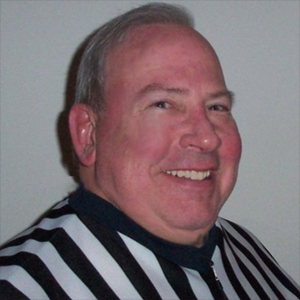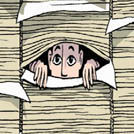
Rndballref
20 Years Experience
Chicago, IL
Male, 60
For twenty years I officiated high school, AAU and park district basketball games, retiring recently. For a few officiating is the focus of their occupation, while for most working as an umpire or basketball referee is an avocation. I started ref'ing to earn beer money during college, but it became a great way to stay connected to the best sports game in the universe. As a spinoff, I wrote a sports-thriller novel loosely based on my referee experiences titled, Advantage Disadvantage
1) If the foul is called as a flagrant technical, then 2 shots + the ball,
2) If the foul is a common foul, and then a technical foul also is called, then:
shoot the free throws in the order the fouls occurred. So clear the lanes for a one + one. Then any player shoots the 2 Ts. Then ball at half court.
High school technicals are always 2 free throws, unless they are cancelled out by simultaneous technicals by both teams.
I don't know how else to say this...in high school rules, we NEVER award free throws on a player or team control foul. We also NEVER count the basket if a player control foul was called on the shooter.
That is why it does not matter if the team is in the bonus - in any case, free throws are not awarded on a control foul. It is by definition in the rule book - a control foul (team or player) never earns free throws.
Maybe you are confused by the terms - notice I did not say charging fouls instead of control fouls, because charging is just one type of foul committed by the offense. For example, free throws are not awarded for an illegal screen by the offense (as of about five years ago).
Based on your question, I want to referee a game probably more than you want to watch one.
All players inside the 3 point arc (shooter and rebounders) cannot cross the vertical planes into the rectangle (otherwise known as the three second area) until the ball touches the ring. If a rebounder violator is on the same team as the shooter, the free throw is whistled dead and the point cannot count. If there was to be another free throw, then the players line up and it is shot. If this was to be the last free throw, then the ball is awarded to the opponent for a throw in.
If the defensive team (non-shooter) steps into the forbidden area, then the referee holds his fist straight out indicating a delayed violation. If the ball goes in, it counts. If the shot is missed, it is retaken.
If the offense and defense both simultaneously violate the free throw lane restrictions, then the shot is whistled dead it does not count. If there was to be another free throw shot, it is taken. If the free throw was to be the last when opposite teams both violate, then the shot is whistled dead and it goes to the possession arrow.
Stand-Up Comedian
 How do you fend off hecklers?
How do you fend off hecklers?
Help Desk Technician
Social Security Employee
 Did the US economic collapse cause a surge in disability applicants?
Did the US economic collapse cause a surge in disability applicants?
In high school rules, a player can retrieve the ball after a "legitimate" shot attempt without hitting anything. For example, you could retrieve an airball shot even though the ball has not been touched by another player. However, f the throw to the backboard is not a shot attempt and a player purposely throws it off the backboard, I would call that travelling - much like tossing the ball forward to yourself and moving down the court.
From the federation rule book, "During a dribble the ball may ve batted into the air provided it is permitted tp strike the floor before the is touched again with the dribbler's hand(s).
So, in you question you could retrieve the ball after it strikes the floor or continue dribbling PROVIDING you have not palmed or carried the ball.
There is no provision for a referee to overrule another official in the Federation rules book, however in practice one official is designated as the referee in a crew with a responsibility to resolve simultaneous calls. My experience is that before the game this situation is discussed between officials. I think it is important to get the call correct, but each referee has his own area to watch. So if I make a call that one of my partners sees a different way I want that official to approach me, tell me what they saw, I give my perspective and then I decided if I will overrule my own decision. That way I can defend the final outcome. So, a few principles: 1) a ref should be watching their own area - that is why you have 2 or 3 of them, 2) there is some overlap and sometimes a second look sees something you can miss, and 3) officials should decide how they will consider overruling each other before the game. Based on your description (that the shot was clearly made from inside the 3 point line), regardless of how the ref's changed the call they apparently got it wrong.
-OR-
 Login with Facebook
Login with Facebook (max 20 characters - letters, numbers, and underscores only. Note that your username is private, and you have the option to choose an alias when asking questions or hosting a Q&A.)
(A valid e-mail address is required. Your e-mail will not be shared with anyone.)
(min 5 characters)
By checking this box, you acknowledge that you have read and agree to Jobstr.com’s Terms and Privacy Policy.
-OR-
 Register with Facebook
Register with Facebook(Don't worry: you'll be able to choose an alias when asking questions or hosting a Q&A.)